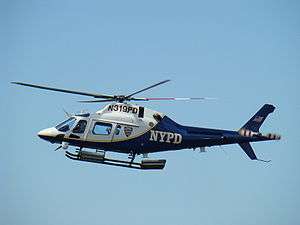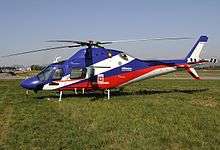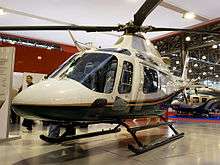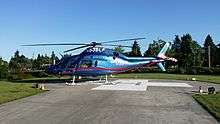AgustaWestland AW119 Koala
| AW119 Koala | |
|---|---|
 | |
| Role | Utility helicopter |
| Manufacturer | Leonardo-Finmeccanica, before AgustaWestland, Agusta |
| First flight | February 1995 |
| Introduction | 2000 |
| Status | Active in production |
| Primary users | Mexico State Government Finnish Border Guard |
| Produced | 2000–present |
| Number built | 200+ (2015)[1] |
| Unit cost |
USD$1.85 million in 2000[2] |
| Developed from | Agusta A109 |
The AgustaWestland AW119 Koala, produced by Leonardo-Finmeccanica since 2016, is an eight-seat utility helicopter powered by a single turboshaft engine produced for the civil market. Introduced as the Agusta A119 Koala prior to the Agusta-Westland merger, it is targeted at operators favoring lower running costs of a single-engine aircraft over redundancy of a twin.[3]
Development
The A119 designation was first applied to a proposed 11-seat stretched version of the A109 in the 1970s;[4] however this concept did not emerge and no such rotorcraft actually built. The helicopter that was eventually to enter production as the A119 was conceived in 1994, as Agusta was recovering from a period of financial woes that had nearly put the company out of business.[5] In February 1995, the second of two prototypes conducted its first flight.[2] The first prototype was used for static tests.[6] Civil certification was originally anticipated in 1997, this deadline was missed allegedly due to multiple issues such as personnel problems, the need to concentrate resources on the development of the A109 Power, and further development to increase the aircraft's performance to meet customer expectations.[2][7]
By way of a solution to the latter concern, the decision was taken to change the A119's powerplant. The prototypes were originally fitted with Turboméca Arriel 2K1 turboshafts, but the ubiquitous Pratt & Whitney Canada PT6B was chosen in its place.[8] In 1998, the prototypes were remanufactured with this engine, and assigned new serial numbers.[6] Certification was now expected by the fourth quarter of that year, but this date slipped to July 1999, and it was eventually December before Italian RAI certification was awarded.[2] US FAA certification was awarded in February the following year.[2] Customer deliveries began soon thereafter,[2] the first commercial example was delivered to Australian logistics company Linfox (serial 14007, registration VH-FOX).[6]
In April 2007, the AW119Ke (Ke standing for Koala Enhanced) was formally unveiled at Heli-Expo; changes included modified rotor blade design and a higher rotor rpm, increasing both payload and hot-and-high performance, cabin flexibility was also improved.[9] The fuselages of the AW119 are manufactured by PZL Swidnik of Poland, later a subsidiary of AgustaWestland.[10] Final assembly and other manufacturing activity initially took place at Vergiate, Italy; by the time the improved AW119Ke variant began production, the final assembly line had been transferred from Vergiate to AgustaWestland's facility in Philadelphia, United States.[11][12]
Design

The AW119 is a single-engine multirole helicopter, AgustaWestland promote the type as possessing excellent flight qualities with high levels of controllability, maneuverability and inherent safety.[13] The design of the rotorcraft is derived from Agusta's earlier and highly successful A109 helicopter, differing primarily by only being equipped with a single engine (as the A109 was originally designed),[5] a Pratt & Whitney PT6B-37A turboshaft engine, and using fixed skids in place of the A109's retractable wheeled landing gear arrangement.[14] The AW119 shares the same cockpit and cabin of the AW109, along with commonality with various other systems, while costing roughly half of the latter's price tag.[7] According to Flight International, the AW119 is competitively priced and provides good levels of accessibility, maintainability, comfort, noise levels, and speed.[15]
The AW119 employs a four-bladed fully articulated main rotor; the composite rotor blades are designed to produce maximum lift with minimum noise, and feature tip caps to reduce noise and elastomeric bearings with no lubrication requirements. Aluminium honeycomb structural panels are used throughout the airframe, which absorb both noise and vibration, thus requiring no additional vibration absorption systems to be employed.[16] The PT6B-37A powerplant of the AW119, located in the same area as the AW109 is capable of providing high power margins along with generous speeds and endurance.[13][17] According to AgustaWestland, the AW119 retains the system redundancy of dual engine helicopters, such as the hydraulics and the dual independent stability augmentation systems; the gearbox has a 30-minute dry run capability.[14][17]
The AW119 Koala has been used for various roles, including utility, emergency medical services (EMS), offshore, law enforcement, and executive transport.[14] A key selling point of the type is its wide-body fuselage, which allows for up to seven passengers to be seated in a three-abreast configuration in the cabin; for the EMS mission, up to two litters along with medical attendants and full emergency medical equipment suite can be accommodated, whereas most similar-sized helicopters can only carry one.[3] The unobstructed cabin area and separate baggage compartment can be rapidly reconfigured to suit a range of different missions and roles. Several different cabin interiors may be adopted to accommodate different missions and operations, such as executive/VIP, EMS, and utility options; the cockpit can also be isolated from the cabin.[13] The AW119 has been promoted as possessing the largest cabin in its class; the reported cabin volume is approximately 30% greater than other rotorcraft in its class.[8][13]
_at_the_Wagga_Wagga_Airport_heli-pad_(3).jpg)
A wide range of avionics have been integrated upon the AW119, which are typically housed within the rotorcraft's nose.[18] Initial production models featured conventional flight instruments;[18] the Garmin G1000 glass cockpit is integrated on the newer AW119Kx variant, which is claimed to improve situational awareness, reduce pilot workload, and increase safety. Primary flight and other key information is displayed to the pilots upon two large 10.4 inch multi-function displays in the cockpit; an independently powered stand-by display is also present in case of system failure. Other avionics used include a 3-axis aircraft flight control system (AFCS), Synthetic Vision System (SVS), Highway In The Sky (HITS) depiction, moving map display, radio altimeter, VOR/ILS/GPS/WAAS navigation, Aural Warning Generator, and embedded Helicopter Terrain Avoidance Warning System (HTAWS).[13]
A variety of equipment can be equipped, dependent on operator choice and role; these include an external hoist, dual cargo hook, dual flight controls, baggage compartment extension, snow skis, windshield wipers, rotor brake, multi-band radios, active noise reduction headsets, soundproofing, oxygen systems, loud speakers, search lights, retractable landing light, emergency floatation equipment, reinforced windshield, wire strike protection system, rappelling kit, fire fighting belly tank, and a forward looking infrared (FLIR) camera.[13] Three fuel tanks, located behind the rear seats in the cabin, are installed as standard; up to two additional optional tanks can be fitted for a total of five, providing a flight endurance of nearly six hours.[7]
Operational history

Since 2009, there has been reports that final assembly of the AW119 is to be transferred to India as a part of a measure to increase sales within that market.[19][20] In February 2010, it was announced that AgustaWestland and Tata Group were to form a joint venture to produce the AW119 in India; the first Indian-manufactured units were originally planned to commence deliveries in 2011.[21] In October 2015, following two years of deliberation, India's Foreign Investment Promotion Board approved a proposal to locally assemble the AW119Kx in Hyderabad, Telangana; the facility is to be operated by Indian Rotorcraft Ltd (IRL), the joint venture between AgustaWestland and Tata.[22][23]
In September 2014, AgustaWestland issued a legal challenge to a US Army decision to procure the Eurocopter UH-72 Lakota as a trainer without a competition, stating that both the AW119 and the AW109 had lower acquisition and operating costs; the challenge was dismissed in December 2014.[24][25] In early 2015, AgustaWestland and Bristow Helicopters jointly offered an upgraded variant of the AW119 as a replacement for US Navy’s existing fleet of 117 Bell TH-57 (based on the Bell 206) trainer helicopters under a fee-for-service contract; AgustaWestland and have claimed that over a four-year period the AW119 fleet could be introduced at an equal or lesser cost than the operating costs than continuing to operate the aging TH-57s.[26][27]
Variants
- A119 - designation for the original production version
- AW119 - designation for the A119 following the merger of Agusta and Westland Helicopters
- AW119 Ke - improved version, featuring redesigned rotors, greater payload, and better fuel efficiency.[28]
- AW119 KXe - successor to the Ke model, produced in Philadelphia, USA and Hyderabad, India.[23][29]
Operators

- New York City Police Department [40]
- Phoenix Police Department [41]
- Life Flight Network (https://www.lifeflight.org/about/fleet)
Specifications (AW119Ke)
|
| |
|
| |
|
|
Data from AgustaWestland website[14][42]
General characteristics
- Crew: 1 pilot
- Capacity: 6-7 passengers
- Length: 13.01 m (42 ft 8 in)
- Rotor diameter: 10.83 m (35 ft 6 in)
- Height: 3.77 m (12 ft 4 in)
- Disc area: 92.1 m² (991 ft²)
- Empty weight: 1,430 kg (3,152 lb)
- Loaded weight: kg (lb)
- Max. takeoff weight: 2,720 kg (6283 lb)
- Powerplant: 1 × Pratt & Whitney Canada PT6B-37A turboshaft, 747 kW (1,002 hp)
Performance
- Maximum speed: 267 km/h (166 mph, 152 knots)
- Ferry range: 991 km (618 miles, 535 nm)
- Service ceiling: 6,096 m (15,000 ft)
See also
- Related development
- Aircraft of comparable role, configuration and era
- Related lists
References
Citations
- ↑ "Life Flight Network to Expand Fleet with Eleven Additional AgustaWestland Helicopters." AgustaWestland, 4 March 2015.
- 1 2 3 4 5 6 "Flug Revue". Archived from the original on 15 June 2007. Retrieved 20 May 2007.
- 1 2 "The Agusta A-119 Koala". airliners.net. Retrieved 2007-05-20.
- ↑ Taylor, Michael J. H. (1989). Jane's Encyclopedia of Aviation. London: Studio Editions. p. 41.
- 1 2 Simpson, R. W. (1998). Airlife's Helicopters and Rotorcraft. Ramsbury: Airlife Publishing. p. 33.
- 1 2 3 Gualdoni, Damiano. "Damiano Gualdoni Aviation Enthusiast's Website". Retrieved 2007-05-20.
- 1 2 3 Gray 2000, p. 40.
- 1 2 World Aircraft Information Files. London: Bright Star Publishing. pp. File 889 Sheet 32.
- ↑ "Rotorcraft Report: AgustaWestland Unveils Enhanced Version of AW119." Rotor&Wing, 1 April 2007.
- ↑ "Business: Good Week - Bad Week." Flight International, 16 March 2009.
- ↑ O'Keeffe, Niall. "AgustaWestland looks beyond national boundaries." Flight International, 31 October 2008.
- ↑ "Aviation News, Volume 69." HPC Pub, 2007. p. 24.
- 1 2 3 4 5 6 "AW119Kx: Fast and Flexible." Finmeccanica, Retrieved: 13 February 2016.
- 1 2 3 4 "AW119Kx." Finmeccanica, Retrieved: 13 February 2016.
- ↑ Gray 2000, p. 43.
- ↑ Gray 2000, pp. 40-41.
- 1 2 Gray 2000, p. 41.
- 1 2 Gray 2000, p. 42.
- ↑ Aviation Week & Space Technology, Volume 170, Issues 1-10. 2009. p. 95.
- ↑ "AgustaWestland firm on expanding footprint in India." The Hindu, 24 September 2013.
- ↑ Pustam, Anil R. "Rotor market strong on technology." Aviation Business, 17 June 2010.
- ↑ "FIPB clears Tata-AW chopper facility proposal in Hyderabad." First Post, 14 October 2015.
- 1 2 Grevatt, Jon. "AgustaWestland's Indian joint venture finally approved by authorities." IHS Jane's Defence Industry, 7 October 2015.
- ↑ Head, Elan. "AgustaWestland sues to block Army purchase of EC145 helicopters." Vertical, 23 September 2014.
- ↑ "Army Moves Ahead with Airbus Trainer Plan." AIN Online, 7 December 2014.
- ↑ Trimble, Stephen. "AgustaWestland, Bristow offer AW119 to replace US Navy TH-57 fleet." Flight International, 15 April 2015.
- ↑ Clevenger, Andrew. "Group Offers Navy New Helo Training Model." DefenseNews, 15 April 2015.
- ↑ "AgustaWestland AW119Ke sales brochure" (PDF). Archived (PDF) from the original on 2007-09-27. Retrieved 2007-05-20.
- ↑ Huber, Mark (3 March 2015). "AgustaWestland to build AW609 in Philadelphia". Aviation International News. Retrieved 5 March 2015.
- ↑ http://secret-difa3.blogspot.com/2013/10/un-nouvel-helicoptere-dentrainement.html
- ↑ "Helicopters". Safety & rescue services. Surf Life Saving Western Australia. Retrieved 31 December 2013.
- ↑ Mena Barreto (2010-08-30). "Estado de Goiás receberá 3 helicópteros AW119 Koala". Piloto Policial (in Portuguese). Retrieved 2010-08-30.
- ↑ http://www.pilotopolicial.com.br/koala-da-policia-militar-de-santa-catarina-completa-1-500-horas-de-voo/. Missing or empty
|title=(help) - ↑ http://www.pilotopolicial.com.br/bavbmrs-helicoptero-transfere-menino-com-avc/. Missing or empty
|title=(help) - ↑ http://www.pilotopolicial.com.br/novo-helicoptero-do-bavrs-transporta-paciente-para-santa-mariars/
- ↑ "The Finnish Border Guard Takes Delivery Of Its First AW119Ke". aviationnews.eu. Retrieved 17 February 2013.
- ↑ "Korea National Police Agency takes delivery of an AW119Ke". helihub.com. Retrieved 10 February 2013.
- ↑ "Finmeccanica-AgustaWestland and Weststar Sign Orders for Three Helicopters". my.agustawestland.com. Retrieved 2015-03-18.
- ↑ "Mexico's State Gov't Air Rescue Unit Completes NGV Instructor Training". aero-news.net. Retrieved 10 February 2013.
- ↑ "NYPD AW119 Fleet Achieve 20,000 Hour Milestone". aviationnews.eu. Retrieved 10 February 2013.
- ↑ "Cop shot takes koala". ainonline.com. Retrieved 10 February 2013.
- ↑ "AgustaWestland website". Archived from the original on 2007-09-27. Retrieved 2007-05-20.
Bibliography
- Gray, Peter. "Flight Test: Koala bared." Flight International, 18 September 2000. pp. 40–43.
External links
| Wikimedia Commons has media related to Agusta A119. |